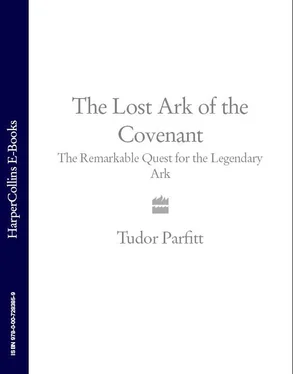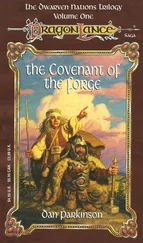THE
LOST ARK
OF THE
COVENANT
THE REMARKABLE QUEST FOR
THE LEGENDARY ARK
TUDOR
PARFITT
Dedication
Maps
1 The Cave
2 The Sign Of His Kinship
3 Protocols Of The Priests
4 The City Of The Dead
5 A Key To The Past
6 Opposites Are One
7 The First Cataract
8 Legends Of The Queen Of Sheba
9 The Tomb Of Hud The Prophet Of God
Maps
10 The Moses Gene
11 The Fire Of God
12 The Sacred Fire Pot
13 Watchdogs Of The King
14 The Dust Of Its Hiding Place
Epilogue
Colour Plates
Picture Credits
Index
Copyright
About the Publisher
For my brother Robin Parfitt, 1946–2006
and his sons Adam and Ifor Parfitt
and his granddaughters Poppy and Ella Parfitt

The Cave
It was a time of drought. In 1987 my home was a grass hut in a dried out tribal area of central Zimbabwe in southern Africa, completely cut off from the outside world. I had been doing fieldwork on a mysterious African tribe called the Lemba. This was part of my job. At the time I was Lecturer in Hebrew in the Department of Near and Middle Eastern Studies at the School of Oriental and African Studies (SOAS) in the University of London and for a while now this tribe had been my main academic subject.
How had I spent my time in the village? In the blistering heat of the day I would wander over the hills near the village and poke around the remains of the ancient stone-building culture, which, the Lemba claimed, was the work of their distant ancestors. With my little trowel I had discovered a few bones, pieces of local pottery and one or two iron tools of uncertain age. Not much to write home about. Then I would read, write up my notes and spend much of the night listening to the elders’ narratives.
The Lemba harboured an astonishing claim to be of Israelite origin, although the presence of Israelites or Jews in central Africa had never before been attested. On the other hand, since early medieval times there had been rumours of lost Jewish kingdoms in darkest Africa. What I had heard was that the tribe believed that when they left Israel they settled in a city called Senna - somewhere across the sea. No-one had any idea where in the world this mysterious Senna was located and neither did I. The tribe had asked me to find their lost city, and I had promised to try.
What I knew about the 40,000 strong Lemba tribe in 1987 was that they were black, they spoke various Bantu languages such as Venda or Shona, they lived in various locations in South Africa and Zimbabwe, they were physically indistinguishable from their neighbours and that they had a host of customs and traditions identical to those of the African tribes among whom they lived.
They appeared to be completely African.
But, on the other hand, they also had some mysterious customs and legends which did not appear to be African. They did not intermarry with other tribes. They did not traditionally eat with other groups. They circumcised their boys. They practised the ritual slaughter of animals, using a special knife; they refused to eat pigs and a number of other creatures; they sacrificed animals on high places like the ancient Israelites; and they followed many of the other laws of the Old Testament. The sighting of the new moon was of cardinal importance for them as it is for Jews. Their clan names looked as if they were derived from Arabic or Hebrew or some other Semitic language.
During the months I had spent in the village trying to unveil their secrets, I never found the absolute proof - the smoking gun, demonstrating that their oral tradition, which linked them with ancient Israel, was true. I never found an inscription on stone, a fragment of a Hebrew prayer, an artefact from ancient Israel. Not even a coin or a shard of pottery.
Before arriving in Zimbabwe I had spent a couple of months with the large Lemba communities in the neighbouring country of South Africa. Here the leaders of the tribe had given me a good deal of information. I had hoped to build on this in Zimbabwe and asked the local Lemba chief to facilitate my research. Chief Mposi called a meeting of the elders of the Lemba clans and, tempted by my promise to try to find their lost city of Senna, they formally agreed to permit me to research their history.
But subsequently they did not tell me nearly as much as I had hoped they would. They were tight-lipped about anything to do with their religious practices. It was only my willingness to sit around late into the night, until my whisky had loosened the old men’s tongues, that had enabled me to hear something of their remarkable cult.
The following day they would regret their nocturnal indiscretions and mutter that the clan elders shouldn’t have authorized my research, that white men had no business meddling in their affairs and that I should stop trying to penetrate the cloak of secrecy which veiled their religious rites.
Others tried to frighten me into leaving by telling me lurid tales of what had happened to previous generations of researchers who had wandered too far down forbidden paths. One of them had been forcibly circumcised after daring to walk on Dumghe, the tribe’s sacred mountain. Another had wandered too close to a sacred cave at the base of Dumghe, and had been stabbed with a traditional assegai and badly beaten. He had narrowly escaped with his life.
As my hopes of finding the critical clue regarding their true identity began to die, so did the crops in the fields around the village. It had not rained at all for months. There was some thick muddy liquid at the bottom of the boreholes. Every morning the women brought water in rusty old oilcans balanced on their heads. When that was gone, there would be nothing left to drink. Except beer from the bottle shop, for people with money. And there weren’t many of those.
This morning, early, before the sun had risen, the chief had called for a rain ceremony. The chief’s messenger had arrived just as the household was beginning to stir. The cooking fire was being blown into life and water was being heated for tea and the washing water, which was brought every morning to my hut by the daughter of my gentle host, Sevias. The messenger told Sevias that his presence would be required that evening. This was a last desperate throw of the dice.
There had been drought for so long that the streams which once had brought life and the occasional fish to the village had completely disappeared. They now looked like goat tracks filled with deep, fine dust. With no water, life in the village would soon become impossible. The tribe would have to move elsewhere. But where? The drought covered the whole land.
Towards evening the elders and notables congregated in the chief’s large hut at the centre of his kraal - the group of huts that formed his property. They had been invited to drink chibuku - home-brewed maize beer, the consistency of porridge, dance the night away and to entreat the ancestors for rain. This was deepest Africa.
Sevias invited me to accompany him. We walked together across the parched earth as he told me about the great herds he had once owned, of the trees groaning with fruit, of the maize which used to be as big as pumpkins.
We were among the first guests. I sat next to Sevias on a baked mud bench circling the hut and watched the preparations for the ancestor party with keen interest. I had never imagined I would be permitted to observe anything as close as this undoubtedly was to the heart of their cult.
Читать дальше













